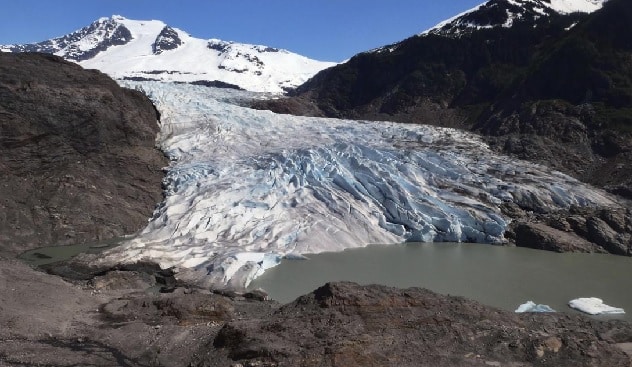What’s in today’s article?
- Why in news?
- What is the WMO?
- News Summary: UN reports off the charts melting of glaciers
- Key highlights of the observations made by UN’s WMO
Why in news?
- The UN’s World Meteorological Organization said that the world’s glaciers melted at dramatic speed last year and saving them is effectively a lost cause.
What is the WMO?
- The World Meteorological Organization (WMO) is an intergovernmental organisation with a membership of 193 Member States and Territories.
- It originated from the International Meteorological Organisation (IMO – a NGO), the roots of which were planted at the 1873 Vienna International Meteorological Congress.
- Established by the ratification of the WMO Convention on 23 March 1950, WMO became the specialised agency of the UN, responsible for promoting international cooperation on –
- Meteorology (weather and climate),
- Operational hydrology and
- Related geophysical sciences.
- The WMO’s Strategic Plan includes –
- Disaster risk reduction,
- The Global Framework for Climate Services (GFCS),
- The WMO Integrated Global Observing System (WIGOS),
- Aviation meteorological services,
- Polar and high mountain regions,
- Capacity development and Governance.
- The Secretariat, headquartered in Geneva, is headed by the Secretary-General and its supreme body is the World Meteorological Congress.
- WMO publishes – Greenhouse Gas Bulletin, Status of Global Climate, etc., reports
News Summary: UN reports off the charts melting of glaciers
Key highlights of the observations made by UN’s WMO
- Concentrations of greenhouse gases hit new peaks
- The last eight years have been the warmest ever recorded, while concentrations of greenhouse gases such as carbon dioxide hit new peaks.
- The concentration of carbon dioxide (CO2) reached 415.7 parts per million globally or 149% of the pre-industrial (1750) level, while methane reached 262% and nitrous oxide hit 124%.
- High temperatures in the oceans
- Record high temperatures were recorded in the oceans — where around 90% of the heat trapped on Earth by greenhouse gases ends up.
- Rise in sea levels
- Sea levels are at a record high, having risen by an average of 4.62 millimetres per year between 2013 and 2022 — double the rate it was between 1993 and 2002.
- Global mean temperature in 2022
- The global mean temperature in 2022 was 1.15 C above the 1850-1900 average.
- Record global mean temperatures over the past eight years came despite the cooling impact of a drawn-out La Nina weather phenomenon that stretched over nearly half that period.
- World’s reference glaciers saw thickness loss
- The world’s reference glaciers saw an average thickness loss of more than 1.3 metres between October 2021 and October 2022 — a loss much larger than the average over the last decade.
- Reference glaciers are those for which long-term observations exist.
- The cumulative thickness loss since 1970 amounts to almost 30 metres.
- The disappearance of the glaciers would limit freshwater supplies for humans and for agriculture, and also harm transport links if rivers become less navigable
- The world’s reference glaciers saw an average thickness loss of more than 1.3 metres between October 2021 and October 2022 — a loss much larger than the average over the last decade.
Q1) What is a glacier?
A glacier is a large, slow-moving mass of ice that forms over many years from compacted snow in areas where snowfall exceeds melting. It flows downhill due to gravity and can carve out valleys and shape landscapes over time.
Q2) What are Greenhouse Gases (GHGs)?
Greenhouse gases are gases in the Earth’s atmosphere, such as carbon dioxide, methane, and water vapor, that trap heat from the sun and warm the planet’s surface. They are called “greenhouse” gases because they work in a similar way to the glass walls of a greenhouse, which trap heat and keep plants warm. However, when the concentration of these gases increases in the atmosphere, it can cause the planet to warm excessively, leading to climate change and other environmental problems.
Source: UN reports ‘off the charts’ melting of glaciers | WMO
Last updated on June, 2025
→ UPSC Notification 2025 was released on 22nd January 2025.
→ UPSC Prelims Result 2025 is out now for the CSE held on 25 May 2025.
→ UPSC Prelims Question Paper 2025 and Unofficial Prelims Answer Key 2025 are available now.
→ UPSC Calendar 2026 is released on 15th May, 2025.
→ The UPSC Vacancy 2025 were released 1129, out of which 979 were for UPSC CSE and remaining 150 are for UPSC IFoS.
→ UPSC Mains 2025 will be conducted on 22nd August 2025.
→ UPSC Prelims 2026 will be conducted on 24th May, 2026 & UPSC Mains 2026 will be conducted on 21st August 2026.
→ The UPSC Selection Process is of 3 stages-Prelims, Mains and Interview.
→ UPSC Result 2024 is released with latest UPSC Marksheet 2024. Check Now!
→ UPSC Toppers List 2024 is released now. Shakti Dubey is UPSC AIR 1 2024 Topper.
→ Also check Best IAS Coaching in Delhi























